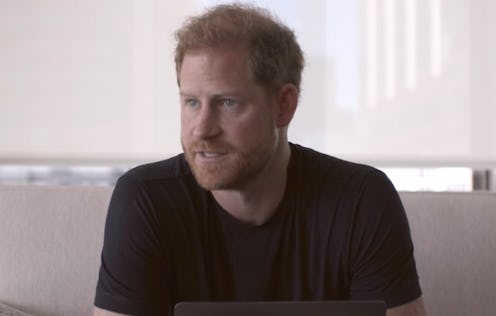Royals
Prince Harry Breaks Down The Royal Rota & How It Works In Candid Confessional
“It all comes down to control,” he explained in Netflix’s eye-opening Harry & Meghan documentary.

Giving a fresh and candid insight into life in the royal family, Prince Harry and Meghan Markle’s new docuseries Harry & Meghan certainly isn’t short on revelations. And we’ve only had three episodes of the series so far. The documentary sees the couple opening up about the intense scrutiny and pressure they face from the media. As well as discussing the toll of growing up around a constant environment of cameras, Prince Harry explains the reciprocal agreement that the royal family shares with the UK media in the third episode of his Netflix show — and his distrust of the small circle of outlets who get to dictate the narrative.
For the last 40 years, the royal family has collaborated with something called the Royal Rota: an exclusive group of UK print newspapers who get first dibs on leading any media coverage of the royal family. Due to a number of different practical circumstances, such as security and space restrictions, it just isn’t possible for every single media publication to accompany members of the royal family on their visits and engagements. And so, instead, this small group of newspapers take it in turns to cover events, and share any photographs or content across the whole rota in return.
According to the Duke and Duchess of Sussex’s official website, the following UK newspapers make up the exclusive group of outlets who take turns covering royal events: The Daily Express, The Daily Mail, The Daily Mirror, The Evening Standard, The Telegraph, The Times, and The Sun.
“If you’re part of the Royal Rota, you have priority over the story, over everybody else,” Prince Harry says in the third episode of the series. “All royal news goes through the filter of all the newspapers within the Royal Rota most of which, apart from The Telegraph, happen to be tabloids. It all comes down to control. It’s like, ‘This family is ours to exploit. Their trauma is our story and our narrative to control.’”
Similarly, the Duke is also sceptical about so-called royal experts and royal correspondents, who often lead coverage of his family. “A royal correspondent is a title, I suppose, that is given to a select group of journalists so that those newspapers can use them and their stories with ‘Royal Correspondent’ as credible fact… anyone can be a royal expert,” he claims in Episode 3. “The whole point of it is to lend legitimacy to media articles, and they get paid for it. That press pack of Royal Correspondents is essentially just an extended PR arm of the royal family. It’s an agreement that’s been there for over 30 years.”
Back in 2020, the Duke and Duchess of Sussex announced that they would no longer be participating in the Royal Rota as part of their new media policy, and would be “adopting a revised media approach to ensure diverse and open access to their work.” Since then, the couple have focused on partnering with grassroots media organisations and specialist media instead.